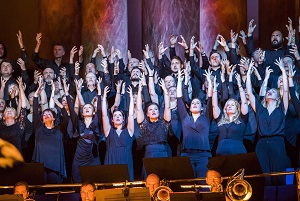British Asian musician Jasdeep Singh Degun talks about his work and upcoming Birmingham performance.
Leeds-based sitarist and composer Jasdeep Singh Degun will be joined by the Orchestra of Opera North at the CBSO Centre on Thursday 19th March for a performance of his new sitar concerto, Arya.
As he prepares to unveil his brand new work, he looks forward to realising his long-held ambition to bring traditional Indian music to a western symphony orchestra – and explains why he’s a very good driver.
“Arya is a Sanskrit word meaning noble, or precious – as well as being a girl’s name, which has been popularised now in the west by Arya Stark in Game of Thrones. But I came up with it before that!
“I’d always been interested in writing a concerto for sitar and orchestra. I’ve written for small ensembles and larger Indian classical orchestras, but never for a full symphony orchestra, so Arya has been a steep learning curve for me. Working with the Orchestra of Opera North and their brilliant arranger Danny Saleeb has been a collaborative process, and it’s given me the tools to get my vision across completely. ©Tristram Kenton

“As an Indian classical musician who was born and brought up in the UK, I’m a product of my surroundings as well as my training. I think all composers are like sponges, they’ll soak up their environments. So Arya isn’t a western classical concerto, and it’s not an Indian classical piece; it’s simply the music that I want to present to the world.
“In Indian classical music we have a limited concept of harmony and there aren’t any key changes; there’s one drone that doesn’t shift for the whole concert. And ours is an oral tradition, mostly improvised: we don’t have sheets of paper in front of us. We’re trained to listen to and repeat very long phrases, to learn the intricacies of the raag (traditional Indian modes, like western scales) without any notation to help us. Indian classical musicians have very good memories: when I’m driving I’m great with directions. I only need to drive somewhere once and I can find my way back very easily!
“It’s completely the opposite with a western classical orchestra, which is trained to perform exactly what the composer has written down on the stave. And within a western concerto, harmony is a key feature of creativity.”
How do you bring these two traditions into balance together without compromising either the spontaneity of the raag or the creative drive of the western orchestra?
“Danny and I have worked hard to give the ensemble what they need in terms of a clearly defined and very detailed score, whilst leaving enough room for the sitarist to feel like they’re not being constricted by a piece of paper. I’ve built in space for some improvisation, but for a sitar player there’s always a lot of scope for that anyway around the given notes.”
The sitar is all about the melody, these characteristic, voice-like embellishments that you get by bending the strings.
“At the beginning of the piece the sitar is introduced to the orchestra, and we follow the instrument like a diamond, a shining light, through this new world of western music.
“The second movement is faster, and the orchestra starts to take over: it’s new territory for the sitar. Then in the third movement the two worlds come together and find common ground.
“I really dislike the word fusion. Arya isn’t about defying genres, or breaking out of the shackles of my tradition. I’ve never felt like that: Indian classical music is my first love, and that’s what I want to pass on to new audiences. I care about music and I care about people, and Arya is about coming together and playing, whilst maintaining the integrity and the intensity of both disciplines.
“Birmingham is special for me because I played at the Symphony Hall a lot with SAMYO, the National Youth Orchestra for Indian Music, and I often go back to perform and collaborate with local musicians and dancers. This will be my first time in the CBSO Centre, though – it’s such a wonderful space, so I’m really looking forward to the concert.”
To complete the programme, the Orchestra of Opera North will be joined by the full force of the company’s Chorus for a series of exquisite excerpts from operas including Madama Butterfly, La Traviata and The Magic Flute – making for a unique evening of sounds from east and west.
Tickets, priced at £18 (£12 concessions), can be booked online at cbso.co.uk, or at the box office on 0121 780 3333.


